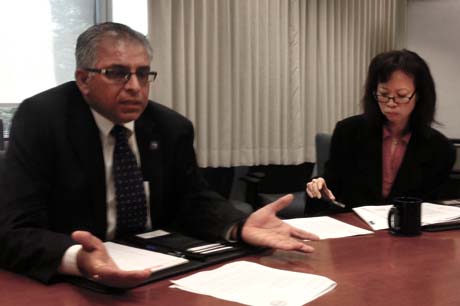County Executive Jeff Smith admitted Friday that significant “culture problems” exist within the county and an internal investigation has been launched into finance officials who may have covered up their role in facilitating crimes committed by former county Supervisor George Shirakawa Jr.
County officials have been scrambling since a Metro/San Jose Inside report last week showed inconsistencies in public statements made by the top two Finance Agency administrators, who have consistently blamed timid subordinates for not catching Shirakawa’s misuse of public funds. In that report, a retired internal auditor also said that county CFO and Director of Finance Vinod Sharma instructed him in 2009 to ignore audits of the county’s 700-plus charge cards—including Shirakawa’s—to focus on performance audits that would impress Smith and the Board of Supervisors.
As a result, Sharma and his top finance assistant, Controller-Treasurer Irene Lui, who also made conflicting statements in public hearings and an interview with Metro/San Jose Inside, are now receiving far more scrutiny for what appears to have been a loss of institutional control.
“I’ve talked to Vinod and Irene at least four times, maybe five times, since Wednesday,” Smith said on Friday evening. “So, we’re doing an appropriate investigation, which is what we have to do.”
The county executive, who is appointed by the Board of Supervisors, said he “noticed three and a half years ago, some significant cultural problems that contributed to the issues with George, which caused other problems.” Smith added that he plans for some of the county’s issues to be addressed with “management training” and “personnel counseling.”
What complicates any investigation into Sharma and Lui is that they’re protected as “classified” employees under the county charter, which means any dispute must go before the personnel board. This often makes any disciplinary process a lengthy, drawn-out affair.
“For reasons that I cannot explain, and I don’t think are good, when the charter was first created all executive management—with a few exceptions—are included as classified employees,” said Smith, who along with the Board of Supervisors and members of the county counsel and executive’s offices are unclassified.
But Supervisor Dave Cortese said the Board of Supervisors has an interest not only in Sharma and Lui’s past and present actions, but also those of Smith, whose contract with the county expires this summer.
“One action the Board of Supervisors could take is to order a full audit,” Cortese wrote in an email. “We can’t deal with Vinod directly—that’s in our Charter—but we will continue to evaluate the response and accountability of County Executive Jeff Smith to the breakdown in handling Supervisor Shirakawa’s expense reports. At the same time, I will be meeting with the county’s independent analyst, Harvey Rose, to discuss a full independent audit.”
(There is some irony in this statement, as Sharma reportedly ignored P-Card audits because he wanted his staff to conduct more “Harvey Rose-type audits.”)
Supervisor Joe Simitian, who rejoined the Board in January after terming out of the State Senate, said the county has failed to date in preventing and addressing the Shirakawa scandal.
“I communicated from day one that my expectations are that the policies and procedures need to be found, the oversight needs to be real and the there needs to be an expectation that we’ll all comply with these procedures,” Simitian said. “I think in this case it’s fair to say the county went 0-for-3.”


What a mess, and now with the disclosures about the DA, I guess you can’t count on anyone in the County to have your back.
What are the disclosures about the DA?
http://www.mercurynews.com/crime-courts/ci_22989777/county-executive-seeks-ags-opinion-das-actions
“a retired internal auditor also said that county CFO and Director of Finance Vinod Sharma instructed him in 2009 to ignore audits of the county’s 700-plus charge cards—including Shirakawa’s—to focus on performance audits that would impress Smith and the Board of Supervisors.”
If Mr. Sharma was in fact highly motivated to please his boss (the county executive), then we must assume his actions (ignoring one area of responsibility in favor of another), represent what he thought were his boss’s priorities. And given Mr. Sharma’s high office and experience under Mr. Smith, we must assume he has for years been successful in accurately comprehending those priorities (otherwise he would never have advanced). Thus we are left with one of two possibilities: either Mr. Sharma did exactly what Mr. Smith wanted during this period of several years (highly likely), or he completely missed the mark (doubtful).
Mr. Smith’s job is to direct and oversee the performance of his subordinates. If a subordinate has strayed off course or failed to fulfill his responsibilities it is Mr. Smith’s job to notice and correct it. Unless I am missing something, amidst the clouds of misstatements, contradictions, and uncertainty, one compelling fact remains plain to see: the audit component of the credit card program was neglected with disastrous results. And that compelling fact illuminates another: Mr. Smith did not do his job—at least his job according to the public’s understanding of it.